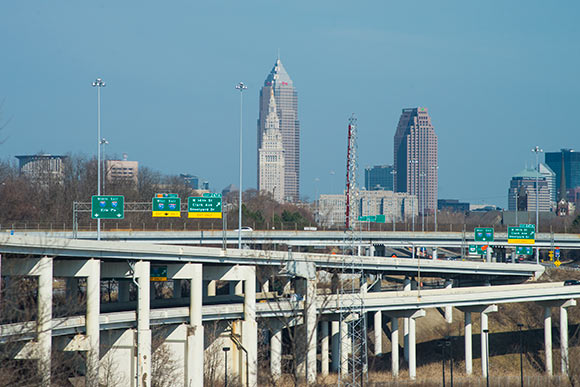Millennials are flocking to Cleveland, report shows, but city must prepare for the future
 Bob Perkoski
Bob Perkoski
Cleveland ranks eighth in the country for population growth among college-educated millennials, a report commissioned by the Cleveland Foundation shows, but officials say the city has to make sure the city continues to make Cleveland an attractive place to this generation going forward.
The study, “The Fifth Migration: A Study of Cleveland Millennials,” was done by the Center for Population Dynamics at Cleveland State University and shows that downtown Cleveland saw a 76 percent increase in residents ages 25 to 34 since 2000. The term “fifth migration” refers to the re-urbanization of metro areas.
Additionally, the study shows a higher concentration of millennial residents overall in Cleveland, regardless of education. In 2013, 24 percent of Greater Cleveland’s population was comprised of millennials ages 18 to 34, up from 20 percent in 2006. The report notes that Cleveland ranks eighth, tied with Seattle and Miami, for its millennial growth from 2011 to 2013 and for those with advanced degrees.
But just because millennials are choosing to settle in Cleveland – 63 percent of the downtown population were millennials in 2012 – does not mean city planners can relax.
“This fifth migration, the force of the millennial generation in the United States, is real and powerful,” says Lillian Kuri, program director for arts and urban design at the Cleveland Foundation. “This study makes it clear that we have to start planning. All of the things they’re interested in are different than the fourth migration, or baby boomers. We have to attract them.”
Millennials are moving here from places like Brooklyn because of the low cost of living and job opportunities, Kuri says, but officials need to ensure that the opportunities continue.
“We need to continue to do that,” she stresses. “There are policy changes we need to think about. This generation finds it easier to work out of the house. We need to not just allow that, but encourage people to start their own home businesses.”
Kuri stresses that this is just the beginning of the fifth migration, and Cleveland needs to keep up with the millennial population if it is to continue to attract this generation. “All of the things they are interested in, we have to attract them,” Kuri explains.
For instance, this generation demands a variety of transportation options. “Transportation is important,” says Kuri. “Millennials want multiple forms of transportation. They’re okay with having one car and sharing the car. We need to have choices of transportation and be robust in it moving forward.”
While the numbers show that well educated millennials are moving to the city, officials need to maintain a diverse population and create an urban environment that attracts all ethnicities, races and education levels. “We have to think about diversity,” she says. “How do we keep millennials here who don’t have college degrees? We have to think about leveraging technology education and creating jobs for these people.”
Housing is another factor. Kuri says millennials are marrying later and therefore enjoy the array of rental housing now available downtown and around University Circle. But they may eventually want to buy homes.
“How do we create the next generation of products?” Kuri asks. “We don’t think they’re just going to move to the suburbs. Eventually millennials will want to buy [homes].”
Kuri cites Lakewood, which has a high millennial population, as an example of a city that’s doing things right -- with a good mix of both rentals and homes for sale.
“Lakewood has the highest concentration of millennials, both college and non-college educated,” she explains. “One should understand what’s going on in Lakewood. Their focus on housing there is really interesting.”
Kuri stresses that Cleveland has to harness this trend to ensure a prospering city in the future. “The millennial generation is such a large percentage of the population that is emerging as a force in the city,” she says. If we don’t continue this trend we’re not going to see any growth in this region. The question is, who’s going to do it best, who’s going to make it sustainable. If we don’t have good product, they will go to another city.”

